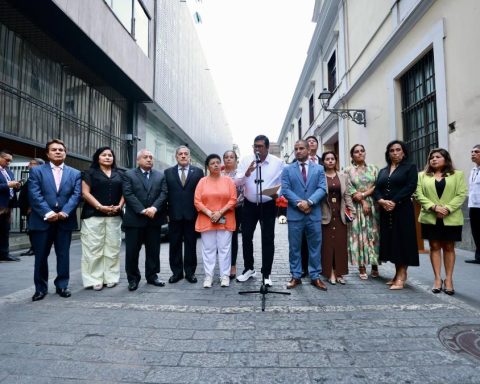the national deputy Alexander Cacace (Together for Change-San Luis), aligned with the Radical Evolution group led by Senator Martin Lousteauformally presented this Monday a bill that promotes the “official dollarization” of the Argentine economy, an initiative that was rejected and described as “clowny” and “stupid” by the head of the UCR and governor of Jujuy, Gerardo Morales.
“The dollar of the United States of America is established as the legal currency of the Argentine Republic,” says the first article of the project that Cacace presented in Parliament and whose details he disseminated on Twitter.
It’s about the first time that a bill is presented in Congress to dollarize the economy, an idea that was outlined by the former Minister of Economy Domingo Cavallo but which he never finished giving shape to.
Last year Cavallo returned to promote his idea by exposing convened by the Eseade university center and proposing that the dollar should be allowed to circulate as currency in the country, while in 2020 he said something similar in an interview with Ecuadorian media, where dollarization governs since the government of Jamil Mahuad, in 1999.
“To believe that with 7 articles of a bill the problems of the economy and inflation in the country are going to be solved is a great stupidity.”Gerardo Morales
Cacace’s project, on the other hand, goes against the historical position that the UCR had on these issues. From the leadership of Evolución Radical they clarified that Lousteau is “absolutely in disagreement” with the initiative because for the senator dollarization “is not only unfeasible but would be negative” for the country.
They also pointed out that Cacace presented it “in solitude” without the signature of any member of that bench.
Morales said on Twitter that “I completely reject the clownish project presented by a deputy from Evolution. You have to be irresponsible and naive, to say the least, to argue that dollarization is the way out. Dollarization is worse than convertibility.” He added that “this has already caused us irreparable damage in the past, destroying the country’s productive apparatus.”
“Believing that with 7 articles of a bill the problems of the economy and inflation in the country are going to be solved is a great stupidity”, emphasized the head of the national radicalism.
I completely reject the clownish project presented by a deputy from Evolution. You have to be irresponsible and naive, to say the least, to argue that dollarization is the way out.
Dollarization is worse than convertibility.(+)
– Gerardo Morales (@GerardoMorales) March 28, 2022
And he maintained that “it is a delirium to think that the Central Bank is going to have dollars to change people’s pesos. We already know these orthodox and neoliberal proposals, they are old, backward and failed in the country.”
Until this Monday, the only leader who had spoken publicly in favor of dollarizing the economy was the “libertarian” Javier Miles, since no JxC representative chose to promote the decision that Argentina renounce monetary sovereignty.
The dollarization of the economy would imply the disappearance of the Argentine peso and the adoption of the dollar as the currency of current use, which would end the sovereign’s ability to have a currency policy.
The Cacace project, specifically, proposes “to establish the dollar of the United States of America as legal tender of the Argentine Republic.” It also sets the exchange rate for conversion between the peso and the United States dollar, which will be equal “to the quotient between the monetary and non-monetary liabilities of the Central Bank of the Argentine Republic and the International Reserves.”
It indicates that when the law enters into force, the BCRA will exchange the pesos “in circulation for dollars of the United States of America at the conversion exchange rate” set by the monetary institution.
After this exchange, all financial operations, such as deposits, credits, issuance of securities and any other carried out through the financial system, as well as the accounting records of the financial system, “will be expressed in dollars of the United States of America.”
Another of the measures proposed is to impose a term of 180 days for the entry into force of the new currency and the cessation of the peso.
In the fundamentals, Cacace points out that the proposal has “as its main objective to stabilize the economy and solve the problem of high inflation that has affected our country for decades.”
“In the last 40 years we have suffered 17 economic crises. We are one of the economies with the greatest sustained and general rise in prices in the last century. In our country there is spontaneous dollarization. People do not trust the currency and choose to get rid of the pesos and go towards the dollar,” he added.
Cacace stated that Ecuador, when it applied this measure, “had 100% annual inflation”, since then “that rate was rapidly reduced until it reached one digit in 2002”.
He added that “since then it has remained stable and its economy has experienced a drop in the unemployment rate and growth of its economy at an average higher than that of the region, with only one year of recession prior to the pandemic.”
On the consequences of dollarization in his country, the former president of Ecuador Rafael Correa, also an economist, shared dozens of times a very critical look at that measure, which he considered “monetary suicide.”
“For a developing country, the bottleneck, the crucial factor, is its external sector. And the main instrument to control that external factor is called the exchange rate. And that, naively, absurdly, Ecuador renounced. It committed monetary suicide,” Correa said when he assumed the Presidency in 2007.
But Cacace vindicated the proposal and stated that “one of the greatest benefits of dollarizing would be the development of credit, which in Argentina is one of the smallest in the region.”
“Having a hard currency valued by Argentines as a reserve of value will allow us to deepen credit in the long term, with what this potentially means for the growth of our economy,” the JxC legislator, who is a lawyer, tweeted.
In order to stabilize the Argentine economy, and put an end to the problem of inflation, I have presented today in the National Congress ? an official dollarization bill.
Here the link to the text of the project and the fundamentals.
?? https://t.co/ZY3qlsu4Ly pic.twitter.com/kNQCXr83RN
– Alejandro Cacace (@alejandrocacace) March 28, 2022
















